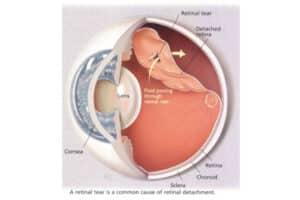 Retinal detachment is a true ocular emergency as it can lead to permanent vision loss in the affected eye. Due to that fact, it is important for everybody to know the symptoms of a Retinal Detachment so they know when to go see their eye doctor….immediately.
Retinal detachment is a true ocular emergency as it can lead to permanent vision loss in the affected eye. Due to that fact, it is important for everybody to know the symptoms of a Retinal Detachment so they know when to go see their eye doctor….immediately.
What is Retinal Detachment?
Eye doctors often ask patients if they have had any flashes of light or have been seeing “floaters” during a routine eye exam. While having a few floaters in your vision is normal, an increase in your floaters, especially when accompanied by flashes of light, could indicate a retinal tear or detachment. If you or a loved one notices these symptoms, or a loss of vision or a curtain coming down over your vision, then getting a dilated eye exam with an optometrist or ophthalmologist ASAP is crucial. Do not wait a few days to see the eye doctor in hopes that it gets better. If a patient is having a retinal detachment and it is caught within 24-48 hours, then treatments are much more likely to have a good outcome. This is not something you want to wait a week to see if it gets better, folks who try that strategy are much more likely to have significant vision loss that is permanent.
What are floaters? Lots of people have floaters, especially those who are near sighted. Many patients end up getting their first floaters in their 30s or 40s, but they can happen earlier than that. When patients present to their eye doctor with a complaint of floaters, they often tell their optometrist that there is something floating in their vision, like a gnat or an amoeba. Yet when they try to swat it, they can’t catch it. Further questioning from their eye doctor typically reveals that it is only seen in one eye, and it moves around the room as they look around the room. Having floaters that are stable are not very disconcerting to your eye doctor. Yet if you tell your optometrist or ophthalmologist that your have new floaters or worsening floaters (or a spider web or veil) in your vision, your eye doctor is going to want to dilate your eyes.
What are flashes? When a patient comes in and tells us they have had flashes of light, the first thing we need to do is dig deeper to rule out an ocular migraine. Ocular migraine is a neurological issue that will be covered in a future blog post. It has very little to do with the retina itself. True flashes are often described as sparks or lightning bolts in the side vision. If you mention these symptoms, especially in conjunction with a new floater during your eye exam, odds are you’ll be dilated right away. Any eye doctor worth their salt would counsel you that you need to be dilated. They can’t make you agree, but any eye doctor who did not try to persuade you to get dilated with such symptoms would be suspect.
There are too many treatment types or retinal detachments and tears to cover them all here, but suffice to say that if a retinal tear or detachment were detected during the dilated eye exam, the patient needs to consult with a retinal surgeon promptly for treatment. Retinal detachment is sometimes caused by head trauma like a fall or car accident, but can also occur spontaneously. People who are extremely nearsighted (-7.00 and up) are slightly more likely to have a retinal detachment. So are patients with certain retinal degenerations such as lattice degeneration. If you think you may be experiencing a retinal detachment and you cannot be seen the today at our office, then please go elsewhere for a dilated exam. The eye doctors at Cannon EyeCare will always do our best to work in patients of record who have an ocular emergency, even if we are fully booked. If you don’t live in Seattle, your local eye doctor will probably do the same.
Sincerely, Dr. Mark J. Cannon, optometrist @ Cannon EyeCare (at Market Optical) in Seattle, Washington
